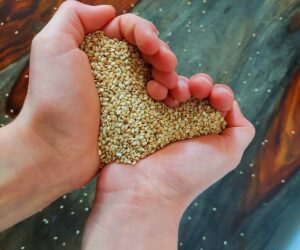Recently, I have been observing a growing interest in the subject of gratitude and how it can improve people’s wellbeing, especially during these unpredictable and uncertain times we’re living in.
HOW MY JOURNEY BEGAN
A few months ago, I was invited to the Facebook-based Gratitude Group. This was an online community focused on practising thankfulness in our day-to-day lives. Their three aims were: encouraging us to read the spiritual self-help book ‘The Magic’ by Ronda Byrne, the 28-day performance of tasks recommended by the author of the book and sharing our insights with others. This was the beginning of my thankfulness journey. The journey, I am still continuing today.
ASKING QUESTIONS ABOUT THANKFULNESS
I understand gratitude as acknowledging the goodness in my life, realising where it comes from, and appreciating it. During the last few months, I have noticed that gratitude has positively impacted my life in so many different ways. Not just by improving my mood and feeling more optimistic. I have also reconnected with old meaningful relationships, and improved my ability to manage life’s inevitable stress. Experiencing these personal changes coupled with my interest in sleep made me ask: is gratitude beneficial to people who struggle with sleep, and if so, how?
LOOKING FOR ANSWERS
During my research, I found out that gratitude interventions were consistently proven to increase our psychological well-being. This included factors like subjective happiness and life satisfaction, as well as reducing symptoms of depression1. With these promising results in mind, I was still searching for information relevant to sleep. Finally, I read the latest review of gratitude interventions on physical health and health behaviours2.
19 different studies were analysed. These concentrated on either objective physiological functions (i.e. blood pressure and cortisol level) or subjective ones (i.e. self-reported physical pain and sleep quality), or occasionally both. Overall, the research concluded mixed findings regarding the efficacy of gratitude in improving physical health. Yet, the studies supported the notion that this type of intervention can improve subjective sleep quality. Thus, it might be beneficial for people who struggle with restorative slumber.
More research is definitely needed to gain a better understanding of how gratitude affects our sleep quality and quantity. Still, the current scientific findings are encouraging if you struggle with sleep. I think that practicing gratitude in our day-to-day lives can help us get the best out of the day. As a consequence, we will sleep better.
WHERE TO START?
Not sure how to start implementing gratitude into your routine? I expect some of us might say that ‘it’s easier said than done’. Yes, you are right. Some people find it easier than others to adopt and continue practicing thankfulness. This is influenced by factors including genes, brain structure, personality3, or even culture4. But the good news is, that the more often you do it, the easier and more natural it becomes. Like a lot of life’s challenges, starting is the most difficult part. But once you have started, you have already jumped over the biggest hurdle!
There are many ways to implement gratitude in our daily life. Journaling is one of them, which I wrote about in one of my previous articles. This is something I practice myself. Another idea is to write a letter, card or message saying ‘thank you’ to somebody who did something for you. If possible, try to deliver it in person as soon as you wrote it. Or if you are feeling extra creative, you could make a gratitude photo collage of the people, things and events in your life which you are thankful for.
There are loads of other ways to exercise your thankfulness. I hope you will find one that resonates with you. I would love to hear your experience with gratitude, so please share it in the comment section below.
Thank you so much for reading.
References
1.Dickens, L. R. (2017). Using gratitude to promote positive change: A series of meta-analyses investigating the effectiveness of gratitude interventions. Basic and Applied Social Psychology, 39(4), 193–208. https://doi.org/10.1080/01973533.2017.1323638
2. Boggiss, A. L, Consedine, N. S, Brenton-Peters, J. M, Hofman, P. L, Anna S.Serlachius, A. S. (2020). Systematic review of gratitude interventions: Effects on physical health and health behaviors. Journal of Psychosomatic Research, 135. https://doi.org/10.1016/j.jpsychores.2020.110165
3.https://greatergood.berkeley.edu/article/item/why_is_gratitude_so_hard_for_some_people





Wow! This article is awesome!
Hi, Thank you for reading it and for your support. I appreciate it.
This article is SO wonderful Alicja! Thank you so much for sharing your gratitude journey and how it links with sleep. So grateful you joined my gratitude group and I love how it had such a profound impact in your life. For me, I use to have a lot of anxiety. When I started practicing gratitude, my anxiety vanished and also led to much more peaceful sleeps for me. For which I am SO grateful! I love reviewing my day before I sleep and finding the thing about that day that I am MOST grateful for. I really feel into that one thing with overflowing gratitude. It’s a wonderful way to drift into sleep.
Liz, thank you for your beautiful comment. I am so grateful for meeting you and joining the group. Thank you for sharing your gratitude experience and how it improved the quality of your life and sleep. Warmest Regards